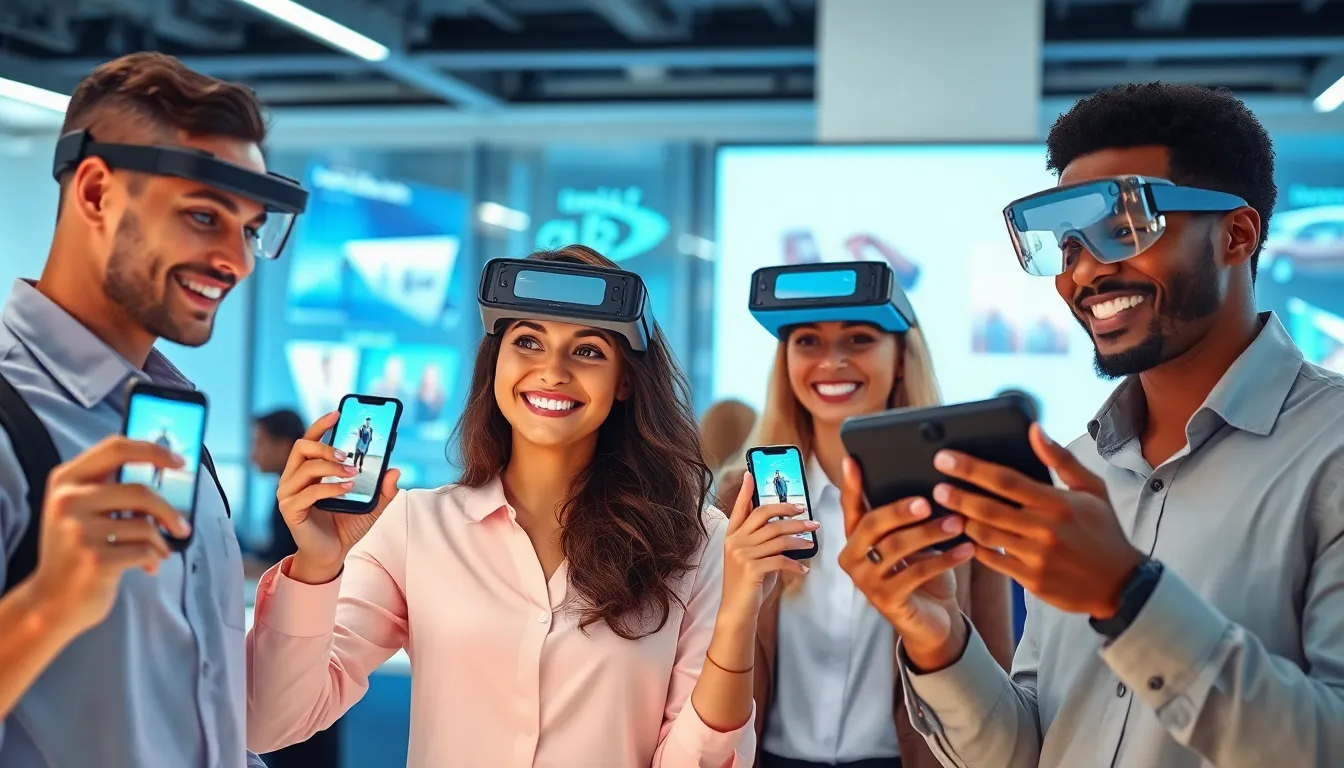In a world where reality sometimes feels a bit too mundane, augmented reality (AR) swoops in like a superhero with a cape made of pixels. Imagine blending the digital and physical worlds seamlessly, creating experiences that make users go “Wow!” or perhaps even “Did that just happen?” An augmented reality app development company holds the keys to this magical realm, transforming everyday interactions into extraordinary adventures.
With AR technology on the rise, businesses are jumping on the bandwagon faster than a kid on a trampoline. Companies that specialize in AR app development are not just tech-savvy; they’re visionaries crafting the future of user engagement. They know how to turn a simple shopping experience into an interactive treasure hunt, leaving customers delighted and coming back for more. If you’re ready to elevate your brand and give your users a taste of the extraordinary, it’s time to explore the wonders of augmented reality.
Augmented Reality App Development Company
Augmented reality (AR) integrates digital information with the physical environment, enhancing user interaction. Unlike virtual reality, which immerses users in a completely digital space, AR overlays graphics, sounds, and other sensory elements on the real world.
The technology employs devices like smartphones, tablets, and smart glasses, making AR accessible to a broad audience. By leveraging computer vision, simultaneous localization and mapping (SLAM), and depth tracking, AR creates seamless experiences that feel natural and intuitive.
AR applications span various industries, including gaming, retail, education, and healthcare. In gaming, titles like Pokémon GO demonstrate how AR can transform a simple walk into an adventure by blending virtual creatures with real-world locations.
Retail brands use AR to enhance customer experiences through virtual try-ons and interactive product displays. For example, companies like IKEA provide customers with the ability to visualize how furniture fits into their homes before making a purchase.
Education also benefits from AR, allowing students to engage with complex concepts through interactive visualizations. Medical students can explore 3D anatomical models, enhancing their understanding of human anatomy.
Healthcare applications of AR enable surgeons to overlay critical information during procedures, improving precision and outcomes. By providing real-time data, AR supports informed decision-making in high-stakes environments.
The growth of AR technology indicates a demand for skilled augmented reality app development companies. These companies help businesses harness AR’s capabilities, driving innovation and creating unique solutions tailored to specific needs.
Individuals increasingly seek personalized experiences. As businesses explore AR technology, they can elevate customer engagement and create memorable interactions that distinguish their brands in competitive markets.
Importance of Augmented Reality App Development

Augmented reality technology significantly enhances various sectors, driving businesses and user engagement. The integration of AR apps into business strategies showcases profound benefits.
Benefits for Businesses
AR app development offers businesses unique advantages. It boosts marketing efforts through interactive advertisements that capture consumer interest. Companies can create immersive experiences that showcase products, which leads to increased conversion rates. Improved customer insights stem from data collected through AR interactions, allowing businesses to better understand consumer preferences. Additionally, cost reductions arise as AR solutions can streamline processes, ultimately enhancing operational efficiency. Investing in AR can also position a brand as an industry leader, fostering a reputation for innovation and customer-centric solutions.
Impact on User Experience
User experiences transform remarkably with AR applications. Enhanced interactivity engages users, making activities more enjoyable and memorable. Imagery and animations overlay the real world, creating captivating scenarios that keep users coming back. Personalization of content caters to individual preferences, ensuring memorable and relevant experiences. Immediate feedback during interactions allows users to make informed decisions swiftly. These aspects collectively elevate user satisfaction while encouraging deeper brand loyalty. As a result, an augmented reality approach proves invaluable for improving customer relationships and experiences.
Criteria for Choosing an Augmented Reality App Development Company
Choosing the right augmented reality app development company involves careful consideration of various factors that directly impact project success.
Technical Expertise
Evaluating technical expertise is crucial for ensuring the company can handle the complexities of AR development. Experience with various AR platforms and tools, such as ARKit, ARCore, and Unity, plays a significant role in delivering high-quality apps. A deep understanding of 3D modeling, computer vision, and interactive design is essential for creating immersive experiences. The team should also demonstrate proficiency in programming languages like C# and Java. Collaboration with industry-specific experts can further enhance functionality and user experience.
Portfolio and Case Studies
Reviewing a company’s portfolio provides insights into their previous work with AR applications. Diverse projects across various industries showcase the company’s adaptability and creativity in solving unique challenges. Case studies highlight successful deployments, detailing objectives, processes, and outcomes. Assessing the quality of these projects helps determine the company’s ability to deliver engaging and user-friendly experiences. Positive client feedback and documented success stories indicate a proven track record in crafting effective AR solutions.
Top Augmented Reality App Development Companies
Businesses stand to gain substantially from partnering with specialized augmented reality app development companies. These firms offer diverse services tailored to meet various industry needs.
Company A: Overview and Services
Company A excels in creating immersive AR experiences across sectors like gaming and retail. Their services include custom AR application development, user interface design, and AR integration with existing systems. Clients benefit from Company A’s expertise in popular AR platforms such as ARKit and ARCore, ensuring high-quality application performance. Additionally, they provide ongoing support and maintenance services to maximize the impact of AR solutions over time. Their extensive portfolio showcases diverse projects, reflecting their ability to cater to unique business requirements.
Company B: Overview and Services
Company B focuses on transforming customer interactions through engaging AR applications. Their offerings encompass complete AR development cycles, from conceptualization to deployment. They emphasize cutting-edge technologies, utilizing tools like Unity to deliver dynamic content. Their team understands the significance of user experience, ensuring applications remain intuitive and user-friendly. Notably, Company B’s track record of successful client engagements speaks to their commitment to innovative AR solutions. Their ability to adapt to new market trends positions them as a leader in the augmented reality landscape.
Future Trends in Augmented Reality App Development
Augmented reality (AR) app development trends indicate a shift toward enhanced user experiences. Businesses increasingly embrace AR for marketing campaigns, using interactive advertisements that capture attention and improve engagement. Integration of artificial intelligence (AI) into AR applications supports personalized content delivery, tailoring experiences to individual user preferences.
Development of wearable AR devices continues to grow, with smart glasses emerging as an innovative platform. Companies are leveraging wearable technology to create immersive environments, transforming how users interact with their surroundings. Emphasis on location-based services within AR applications enhances real-world interactions, enabling businesses to provide contextually relevant information to users.
Collaboration across industries is becoming more prominent. Partnerships between tech firms and traditional sectors, including healthcare and education, lead to groundbreaking AR solutions. AR’s role in remote collaboration is also expanding, allowing teams to visualize projects and ideas in real time.
3D modeling advancements further enhance the quality of AR applications. Users benefit from improved realism, leading to greater immersion in experiences. Each of these trends aligns with the growing demand for versatile, engaging, and accessible AR solutions.
Sustainability initiatives influence AR app development. Companies increasingly focus on creating eco-friendly applications, promoting sustainable practices through gamification and user engagement. As AR continues to evolve, it will play a crucial role in addressing environmental challenges while driving user awareness and involvement.
AR’s future trends shape the way businesses interact with customers. Companies that stay ahead of these developments position themselves as leaders in delivering innovative experiences that resonate with users’ needs and preferences.
Conclusion
The impact of augmented reality on user experiences is undeniable. As businesses look to stand out in a crowded marketplace, partnering with a skilled AR app development company can provide the edge they need. By leveraging AR technology, brands can create engaging interactions that not only captivate users but also foster loyalty and satisfaction.
With the rapid advancements in AR, companies that embrace this technology are well-positioned to lead their industries. The future of customer engagement lies in the hands of those willing to innovate and adapt. Investing in AR solutions is not just about staying current; it’s about creating memorable experiences that resonate with users on a deeper level.



